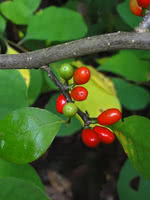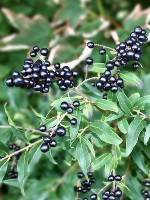Mon-Fri 9am - 5pm Mountain time
Spicebush vs Wild Privet
Lindera benzoin
Ligustrum vulgare
NOT AVAILABLE THIS SEASON - MIGHT RETURN
NOT AVAILABLE THIS SEASON - MIGHT RETURN
The Spicebush is an unique ornamental shrub that blooms with vibrant yellow flowers and bright green foliage. The foliage goes from green to yellow in the autumn, adding fall interest to your garden.The plant is dioecious, meaning that you will need male and female plants in order to harvest it’s red berries. Berries are only produced on female plants. The berries themselves aren’t that sweet, and are mostly enjoyed by birds and other wildlife.
The Spicebush, also commonly known as Common Spicebush, Northern Spicebush, Wild Allspice, and Benjamin Bush, is named after its distinctive spicy-sweet fragrance that comes from the flowers.
Wild Privet is a fast growing ornamental shrub that is well suited for forming hedges and privacy screens. It will retain its leaves in warmer climates but drops them in colder areas. They have small white flowers, though the smell is often considered unpleasant. While the berries are inedible, they are a good food source for many bird species.
It is recommended to prune Wild Privet immediately after flowering, as it can readily self seed. It is deer and rabbit tolerant. It can grow in dry areas, on slopes, and withstand the wind making it well suited for many growing conditions.
Spicebush Quick Facts
Wild Privet Quick Facts
Toxicity: If ingested, all parts of this plant will cause severe discomfort. Toxic to dogs, cats, and horses

